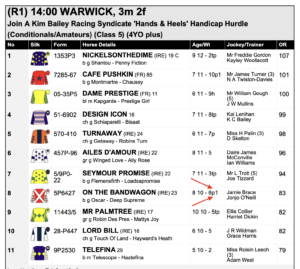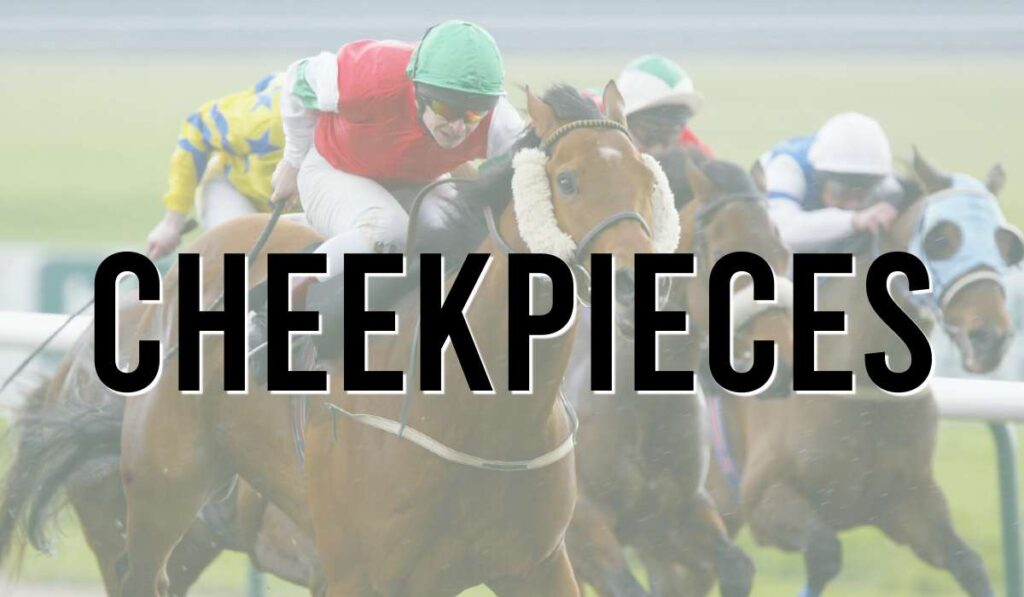Are you curious about which horses are running in cheekpieces today? Look no further! Our regularly updated statistics provide a comprehensive list of all the racehorses wearing cheekpieces in their races today.
In this complete guide to cheekpieces, we cover everything you need to know, from understanding why trainers choose this specific headgear to highlighting today’s runners fitted with cheekpieces. Discover how this equipment can make a difference on the track and see which horses are set to run in cheekpieces today:
[toc]
Today’s Horses Wearing Cheekpieces
Here is the full list of racehorses’ who are running today with the application of Cheekpieces.
Cheekpieces in Horse Racing: A Guide to Their Use and Benefits
When it comes to horse racing, equipment plays a crucial role in maximising a horse’s performance on the track. One such piece of equipment that often goes unnoticed by casual racegoers but is well-known in the racing community is cheekpieces. In this article, we delve into what cheekpieces are, why they are used, how they compare to other pieces of tack, and the impact they can have on a horse’s racing performance.
What Are Cheekpieces?
Cheekpieces are strips of sheepskin or synthetic material attached to the sides of a horse’s bridle. Positioned along the cheeks, they serve to narrow the horse’s field of vision. Unlike blinkers, which completely block out peripheral vision, cheekpieces provide a less restrictive approach. This allows the horse to see what’s ahead while reducing distractions from either side, encouraging greater focus during a race.
Why Are Cheekpieces Used in Horse Racing?
The primary reason for using cheekpieces is to help a horse maintain concentration. Horses, by nature, can be easily distracted by their surroundings, especially during the high-octane environment of a race. A flash of colour, a rival horse, or even the noise of the crowd can divert a horse’s attention, potentially affecting its performance. Cheekpieces, by partially limiting peripheral vision, can help keep a horse ‘on task’, ensuring that its focus remains on running straight and fast.
The Benefits of Cheekpieces
- Improved Focus: By restricting the horse’s side vision, cheekpieces help maintain a straight and direct path, preventing them from wandering off course.
- Gentle Control: Cheekpieces provide a middle ground between a fully open bridle and more restrictive equipment like blinkers. They allow the horse to have some awareness of its surroundings without being overwhelmed by them.
- Enhanced Performance: Horses that have shown a tendency to be ‘spooky’ or easily distracted in past races often benefit from the addition of cheekpieces, leading to improved performance.
- Minimal Discomfort: Made from soft materials such as sheepskin, cheekpieces are designed to be comfortable, avoiding irritation and ensuring that the horse remains calm and composed.
How Cheekpieces Compare to Other Tack
In horse racing, various types of tack are used to influence a horse’s performance. Here’s a brief comparison between cheekpieces and other common options:
- Blinkers: These are more restrictive than cheekpieces, with cups that block out almost all of a horse’s side vision. Blinkers are used when a horse needs significant help in focusing straight ahead without any distractions.
- Visors: Similar to blinkers but with slits cut into them, visors allow slightly more side vision than blinkers. They are often used when a horse needs both some focus and the ability to spot other horses coming up alongside.
- Hood: A hood covers a horse’s head and ears, sometimes including blinkers or earplugs. It’s used to keep a horse calm by reducing noise and light stimuli.
Cheekpieces are often considered when a horse shows signs of needing focus without the full visual restriction that blinkers provide.
Why Put Cheekpieces on a Horse?
Many trainers apply cheekpieces on a horse to help the horse concentrate and avoid distractions.
Most use sheepskin cheekpieces with the exception of some who use extra-large French blinkers.
All cheekpieces partially obscure the horse’s vision, which results in the horse focusing on what it can see in front of them.
The application of cheek-pieces means the racehorse cannot see what is directly behind in its peripheral vision to aid concentration.
How do you Know if a Horse is Wearing Cheekpieces?
You know if a horse is wearing cheekpieces because, in the daily racecards, you will see a ‘p’ beside the horse’s weight.
You may also see a 1, after the letter p, indicating this will be the first time they will be wearing cheekpieces.
Here is an example of a horse racing racecard which shows “p1” beside the racehorse weight to highlight the horse is running in cheekpieces for the 1st time.

The p1 symbol indicates cheekpieces and the number one indicates it is the first time wearing the application of cheekpieces.
FAQs
Q: What are cheekpieces in horse racing?
A: Cheekpieces are strips of sheepskin or synthetic material attached to a horse’s bridle to narrow its field of vision, helping it to focus better during a race.
Q: How do cheekpieces work?
A: Cheekpieces reduce a horse’s peripheral vision, limiting distractions and helping it maintain a straight line while racing.
Q: Why would a trainer choose cheekpieces over blinkers?
A: Trainers may choose cheekpieces over blinkers for horses that need some level of focus but are not overly distracted. Cheekpieces provide a less restrictive alternative.
Q: Are cheekpieces comfortable for horses?
A: Yes, cheekpieces are typically made from soft materials like sheepskin, ensuring comfort and reducing the risk of irritation.
Q: Do all racehorses wear cheekpieces?
A: No, not all racehorses wear cheekpieces. They are used selectively based on a horse’s behaviour and needs as assessed by trainers and jockeys.
Summary of Racehorses Wearing Cheekpieces Today
In the competitive world of horse racing, every advantage counts, and the use of cheekpieces can be a game-changer for certain horses. These simple yet effective strips of sheepskin help maintain focus, minimise distractions, and often improve a horse’s overall performance. Trainers and jockeys understand the value of choosing the right equipment for each horse, and cheekpieces offer a balanced approach to enhancing race-day focus without being overly restrictive.
Whether you’re a seasoned punter or new to the sport, understanding the nuances of racing equipment like cheekpieces can give you better insight into a horse’s chances and behaviour on the track.
Racehorses wear all types of headgear when running in order to help maintain focus.
Headgear ranges from blinkers, and visors to other applications such as applying the hood to settle the horse.

The application of aids, such as cheekpieces can often improve a horse’s performance and for that reason, many punters like to follow and bet on horses who are wearing them.
Related Horse Race Statistics Posts
Here are all the articles related to horse racing stats for the UK and Irish races.
[a-z category=”stats” design=”cards” columns=”4″]